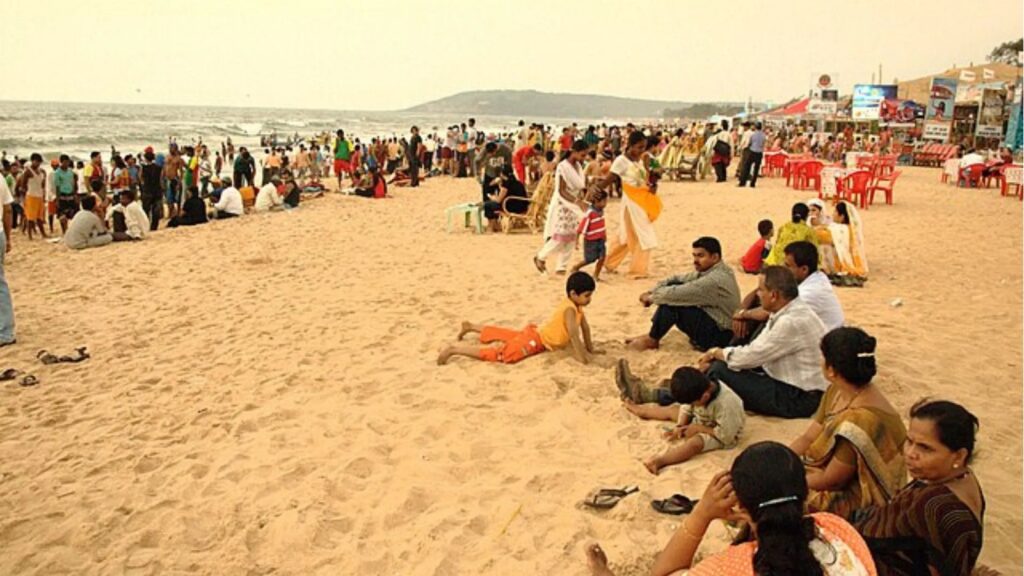A tourism safety force with powers to arrest and fine “touts”, a “sustainability” fee for tourism companies and incentives for sustainable tourism – these are some of the reforms proposed in the draft tourism bill the state government plans to introduce in the monsoon session of the state assembly next month.
Drafted by the state’s tourism department, the bill, called the Goa Tourism Promotion, Control and Regulation Bill, 2024, aims to consolidate and amend laws governing tourism and “protect, conserve and preserve the natural and cultural heritage of the State so as to ensure that Goa remains a destination of choice for tourists.”
The proposed draft bill seeks to repeal two existing laws regulating tourism in the state — the Goa, Daman and Diu Tourism Registration Act, 1982 and the Goa Tourist Places (Protection and Maintenance) Act, 2001.
According to the proposed bill, a tourism safety force consisting of police officers and “tourist security guards” will be formed and deployed in tourism clusters for the safety of tourists.
“The Tourism Security Force will have the power to make arrests in case of non-bailable and indictable offences, search and seize belongings of any person in case of any offence, secure evidence of nuisance and solicitation and impose and collect fines,” the draft said, adding that the force will “coordinate with all state departments and agencies to ensure safety and security of tourists in tourism clusters.”

The draft bill would make state tourism chiefs responsible for deploying tourism safety forces.
On the other hand, the “Tourist Security Guards” will assist police officers in preventing crimes against tourists and ensuring the safety of tourists, assist local administrations and police in preventing drug trafficking, illegal alcohol sales and illegal alcohol consumption, detain those found violating the provisions of the law, warn tourists about touts and assist local administrations and police in taking necessary measures.

Notably, Goa’s tourism department has in the past complained about insufficient powers to curb “touts” and said it was “dependent” on the police to enforce the law, especially along the coast. It has also called for amendments to the laws regulating tourism.
Officials said the new draft law would give the tourism department powers to set up a “tourist safety force” to work closely with police to curb touts and harassment of tourists.
The Goa Police already has a specialised unit called the “Tourist Police”, which was set up in 1990 to ensure the safety and security of tourists at tourist destinations.
According to the police website, “The Tourism Police, besides ensuring law and order for visiting tourists, also assists the Tourism Department in implementing the provisions of the Goa Tourism Registration Act, 1982, which regulates tourism related activities in the state.”
Tourism Minister Rohan Kante said a legal framework was needed to curb touting and other illegal activities because current regulations often allow violators to escape severe punishment.
“The proposed Bill has been made public and authorities are seeking comments and suggestions from stakeholders, including industry associations, advocacy groups and the general public. The Bill is likely to be introduced in Parliament in the next monsoon session,” he said, adding that the safety and security of tourists was of “utmost importance”.
The Need for Legislation – “Sustainable” Tourism
According to officials of the tourism department, changes in the tourism industry due to technological advancements, procedures and emergence of new tourism practices have felt the need for a comprehensive law “to consolidate and revise the existing laws and policies regulating the tourism industry.”
The draft further reads, “The bill aims to promote structured growth and development of tourism, regulate trade and services related to and incidental to tourism, encourage and promote sustainable tourism, adopt data-based decision-making, prompt redressal of tourist grievances and develop standards for the provision of quality tourism services.”
The bill proposes the creation of a tourism commission that would periodically assess the carrying capacity of tourism clusters. If an area exceeds or is close to exceeding its carrying capacity, the commission would bar new registrations or renewals of tourism businesses there.
The Bill also proposes incentives to promote the adoption of sustainable tourism, such as levying a “Tourism Development and Sustainability” fee on all tourism enterprises in the state, exemptions from registration and renewal fees for compliance with applicable standards and codes of conduct, and a scheme of grants and capital subsidies for the adoption of sustainable technologies and practices.
© Indian Express Ltd.
First uploaded on: June 16, 2024 07:20 IST


